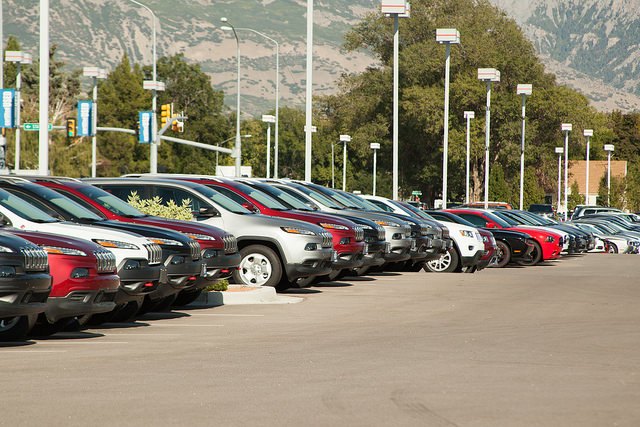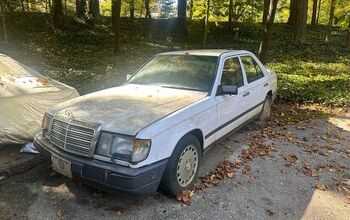Subprime Car Buyers Haven't Defaulted This Much Since '96

Grunge was on its way out the door, Pepsi aficionado Bob Dole was challenging William Jefferson Clinton for the keys to the White House, and the Ford Contour was still a relatively new sight on American roads.
That was the last time this many U.S. car owners fell way, way behind on their subprime auto loans.
According to Fitch Ratings (via Bloomberg), the delinquency rate of subprime auto loans hit 5.8 percent in March, a figure not seen since 1996. Even during the recession, the number of buyers with payments more than 60 days past due just barely nudged over 5 percent.
Following a recession-era spike in subprime car loan defaults, the rate climbed steadily from about 2011 onwards, surpassing the peak of that earlier spike in 2015. Delinquency rose as lenders began approving an ever-greater number of auto loans in the years after the economic downturn — many of them to buyers with poor credit scores. In recent years, “ deep subprime” loans emerged as a concern.
For automakers, the explosion of auto loans, including subprime ones, during the economic recovery helped push the industry to record sales volumes. We’ve since hit a plateau.
Just one year ago, the number of auto loans classified as such (basically, customers with a FICO score below 550) reached nearly a third of all subprime loans. Naturally, lenders were urged to proceed with caution. According to Equifax figures from January, it seems some took that advice to heart — between January 2018 and a year earlier, the number of auto loans and leases approved for subprime car buyers fell 10 percent.
As for who’s approving the riskiest loans, Equifax points the finger away from the big banks.
“Neither banks nor credit unions have done ‘deep subprime’ lending,” Gunnar Blix, deputy chief economist at Equifax, told Bloomberg. “That’s mainly done by smaller dealer-finance and independent finance companies” (that rely on asset-backed securities to stay afloat).
[Image: EveryCarListed P/ Flickr]

More by Steph Willems
Latest Car Reviews
Read moreLatest Product Reviews
Read moreRecent Comments
- Mebgardner I test drove a 2023 2.5 Rav4 last year. I passed on it because it was a very noisy interior, and handled poorly on uneven pavement (filled potholes), which Tucson has many. Very little acoustic padding mean you talk loudly above 55 mph. The forums were also talking about how the roof leaks from not properly sealed roof rack holes, and door windows leaking into the lower door interior. I did not stick around to find out if all that was true. No talk about engine troubles though, this is new info to me.
- Dave Holzman '08 Civic (stick) that I bought used 1/31/12 with 35k on the clock. Now at 159k.It runs as nicely as it did when I bought it. I love the feel of the car. The most expensive replacement was the AC compressor, I think, but something to do with the AC that went at 80k and cost $1300 to replace. It's had more stuff replaced than I expected, but not enough to make me want to ditch a car that I truly enjoy driving.
- ToolGuy Let's review: I am a poor unsuccessful loser. Any car company which introduced an EV which I could afford would earn my contempt. Of course I would buy it, but I wouldn't respect them. 😉
- ToolGuy Correct answer is the one that isn't a Honda.
- 1995 SC Man it isn't even the weekend yet


































Comments
Join the conversation
https://seekingalpha.com/article/4174775-santander-consumer-usa-doubling-worsening-subprime How would you like to be Santander?!?...their largest customer is FCA.
Santander Consumer USA Holdings Inc., a specialized consumer finance company, provides vehicle finance and third-party servicing in the United States. Its products and services include retail installment contracts and vehicle leases, as well as dealer loans for inventory, construction, real estate, working capital, and revolving lines of credit. The company also offers financial products and services related to motorcycles, recreational vehicles, and marine vehicles; originates vehicle loans through a Web-based direct lending program; purchases vehicle retail installment contracts from other lenders; and services automobile, and recreational and marine vehicle portfolios for other lenders. In addition, it provides private-label credit cards and other consumer finance products, as well as point-of-sale financing. The company was founded in 1995 and is headquartered in Dallas, Texas. Santander Consumer USA Holdings Inc. is a subsidiary of Santander Holdings USA, Inc. The premise of the article is that something wrong. But SC is profitable. So much for that.